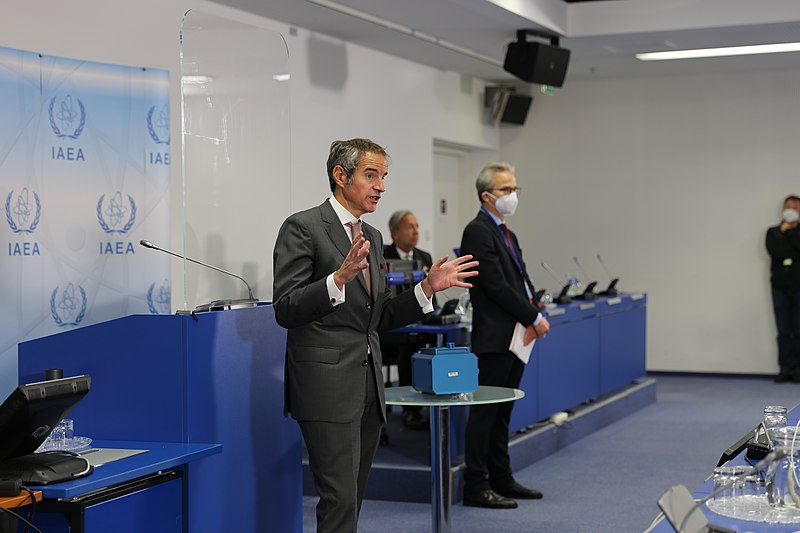Talks between Iranian officials and Western powers regarding the revival of the 2015 nuclear deal appear to be reaching an end, with some signs of a breakthrough. Iranian officials recently held discussions with the UN’s atomic watchdog IAEA as an agreement between both sides appears to be on the horizon.
International Atomic Energy Agency Director-General Rafael Grossi met with Iranian Foreign Minister Hossein Amir Abdollahian and Iran’s nuclear chief Mohammad Eslami in Tehran Tuesday. The main agenda for both sides during the meeting was regarding Iran’s nuclear program and the safeguards of the watchdog’s probes. This included the sites where undeclared radioactive materials were found years back.
Following the meeting, Grossi told reporters that even with the issues regarding IAEA’s safeguards and the Joint Comprehensive Plan of Action being parallel with each other, both are closely related. However, both Grossi and Eslami showed signs of understanding mutual cooperation on the matter.
“It would be difficult to imagine that such an important return to such a comprehensive agreement like JCPOA would be possible if the agency and Iran would not see eye-to-eye on how to resolve these important safeguards issues,” said Grossi.
Eslami said the agency would be provided with documentation on the “remaining issues” by the third Iranian calendar month, which would be in late May.
Iran has long maintained that its nuclear program is to be used for peaceful purposes, with no intention of developing an arsenal of nuclear explosives. Tehran said that the issue of potential military dimensions of its nuclear program should be put to rest as it had already been resolved in the original JCPOA discussions.
Despite an agreement and a revival of the 2015 nuclear deal appearing to draw near, the current crisis in Ukraine as Russia continues its offensive. With Russia’s invasion of Ukraine drawing sets of sanctions and widespread condemnation, Tehran recently made clear that it will not allow foreign powers to impact national interests.
This follows the comments by Russian Foreign Minister Sergey Lavrov, saying that the West must present a written guarantee that the sanctions on Russia will not hinder its trading and cooperation with Iran.



 Iran Supreme Leader Ayatollah Ali Khamenei Killed in Israeli, U.S. Strikes: Reuters
Iran Supreme Leader Ayatollah Ali Khamenei Killed in Israeli, U.S. Strikes: Reuters  Trump Warns Iran as Gulf Conflict Disrupts Oil Markets and Global Trade
Trump Warns Iran as Gulf Conflict Disrupts Oil Markets and Global Trade  Trump Announces U.S. Strikes on Iran Navy as Conflict Escalates
Trump Announces U.S. Strikes on Iran Navy as Conflict Escalates  Israel Declares State of Emergency as Iran Launches Missile Attacks
Israel Declares State of Emergency as Iran Launches Missile Attacks  Marco Rubio to Brief Congress After U.S.-Israeli Strikes on Iran
Marco Rubio to Brief Congress After U.S.-Israeli Strikes on Iran  Trump Says U.S. Attacks on Iran Will Continue, Warns of More American Casualties
Trump Says U.S. Attacks on Iran Will Continue, Warns of More American Casualties  Australia Rules Out Military Involvement in Iran Conflict as Middle East Tensions Escalate
Australia Rules Out Military Involvement in Iran Conflict as Middle East Tensions Escalate  EU Urges Maximum Restraint in Iran Conflict Amid Fears of Regional Escalation and Oil Supply Disruption
EU Urges Maximum Restraint in Iran Conflict Amid Fears of Regional Escalation and Oil Supply Disruption  Russia Signals Openness to U.S. Security Guarantees for Ukraine at Geneva Peace Talks
Russia Signals Openness to U.S. Security Guarantees for Ukraine at Geneva Peace Talks  Netanyahu Suggests Iran’s Supreme Leader Khamenei May Have Been Killed in Israeli-U.S. Strikes
Netanyahu Suggests Iran’s Supreme Leader Khamenei May Have Been Killed in Israeli-U.S. Strikes  HHS Adds New Members to Vaccine Advisory Panel Amid Legal and Market Uncertainty
HHS Adds New Members to Vaccine Advisory Panel Amid Legal and Market Uncertainty  Trump Says U.S. Combat Operations in Iran Will Continue Until Objectives Are Met
Trump Says U.S. Combat Operations in Iran Will Continue Until Objectives Are Met  UK Accepts U.S. Request to Use British Bases for Defensive Strikes on Iranian Missiles
UK Accepts U.S. Request to Use British Bases for Defensive Strikes on Iranian Missiles  Pentagon Leaders Monitor U.S. Iran Operation from Mar-a-Lago
Pentagon Leaders Monitor U.S. Iran Operation from Mar-a-Lago  Middle East Conflict Escalates After Khamenei’s Death as U.S., Israel and Iran Exchange Strikes
Middle East Conflict Escalates After Khamenei’s Death as U.S., Israel and Iran Exchange Strikes  Trump Launches Operation Epic Fury: U.S. Strikes on Iran Mark High-Risk Shift in Middle East
Trump Launches Operation Epic Fury: U.S. Strikes on Iran Mark High-Risk Shift in Middle East  Does international law still matter? The strike on the girls’ school in Iran shows why we need it
Does international law still matter? The strike on the girls’ school in Iran shows why we need it 































